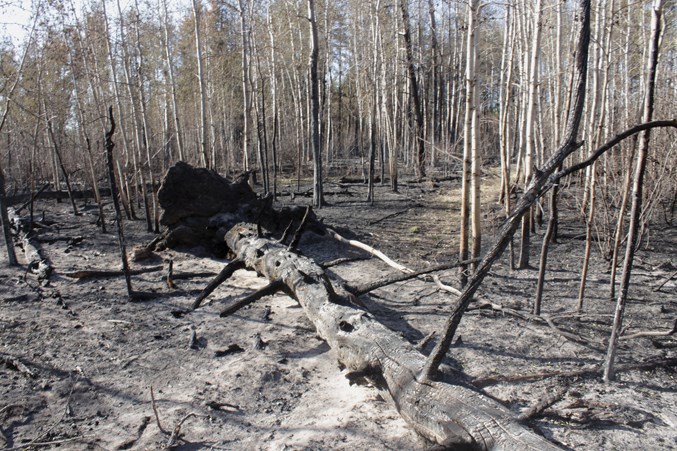Westlock County may be on the hook for some of the costs related to extinguishing two wildfires earlier this year.
Alberta Agriculture and Forestry has requested the municipality pay just over $87,000 in firefighting costs for the 250 hectare Echo Lake fire and the Bouchard Lake fire, which consumed about 26 hectares. The Echo Lake fire accounts for the vast majority of that total, coming in at $86,792, with the remaining $807.70 for the Bouchard Lake fire.
At this point it is just a request and an official invoice has not been sent.
Council passed two motions in regard to the costs of the fires at its Oct. 23 meeting. One, to request a meeting with the minister to discuss the costs and two, to bring forward a resolution to the Pembina Zone 3 meeting of the Rural Municipalities of Alberta.
The Echo Lake fire started May 12. When it was discovered, a request for mutual aid went out to Thorhild County and Sturgeon County and a request for assistance was also made to Alberta Environment and Sustainable Resources who sent wildland firefighters and helicopters to help in the effort to extinguish the blaze.
They were on the scene until May 17 and county crews remained until May 27.
The fire threatened seven residential properties.
An investigator has concluded the Echo Lake fire was caused by shooting on the Crown land in the area, but could not identify the culprit.
“Quite often these fires have been started by people shooting on Crown land. We have met with Alberta Environment and Sustainable Resources over the last four or five years to address these concerns. It’s dangerous and the Crown land, the county has no authority over it,” director of planning and community services Laurie Strutt told council.
She did note the ministry did go so far as to close down a piece of Crown land after a 2015 fire in the same area.
She also said administration has met with ministry staff several times to discuss the problems they have with activity on the Crown land and the fact they have no jurisdiction when people use it as a shooting range.
Chief administrative officer Leo Ludwig added that the federal government’s recent decision to allow for exploding Tannerite targets is also a big problem.
“According to the investigation, that was the cause of this particular fire,” he said, but because a culprit could not be identified the Forest and Prairie Protection Act dictates the costs be forwarded on to the municipality.
“Our argument is there is a clause in the act that says that due to the fact we’ve raised this concern with officials on several occasions and no action was taken to curtail this activity, this activity had implicit approval, or implied approval from the province to take place on their property. That is the crux of our argument.
“We feel that under the principle of fairness that the ministry should pick up the cost.”
Patrick Loewen is director of wildfire prevention with the wildfire management branch, in the forestry division of Alberta Agriculture and Forestry. He stressed that the financial numbers have not yet been finalized for either of the two fires.
“Section 7 of the Forest and Prairie Protection Act establishes that municipalities are responsible for fighting and controlling all fires in their boundaries, except that part of their municipal district that would be within the forest protection area. They’re responsible for all costs and expenses. That’s one clause that is important,” said Loewen.
He went on to quote Section 8 and 9 of the act as well which state the minister is not obligated to reimburse the municipal district spent extinguishing a fire on any land, but may reimburse the municipality for any part of the costs in extinguishing a fire on unoccupied public land.
For costs related to a fire on occupied public land, or private land, the municipality may apply to Municipal Affairs for reimbursement under the Municipal Wildfire Assistance Program, provided they meet the criteria of the program, said Loewen.
Once a municipality spends more than $25 per capita on fighting wildfires, it becomes eligible for the assistance program.
Section 9.2 reads: “Where the Minister incurs costs and expenses as a result of fighting a fire within a municipal district or urban municipality ... that municipality shall on demand reimburse the minister for the entire cost or such part of it as the minister directs.”
Section 9.3 goes on to state that “the persons who are responsible for a fire shall on demand reimburse the minister, the municipal district or the urban municipality, as the case may be, for the costs and expenses of fighting the fire.”



